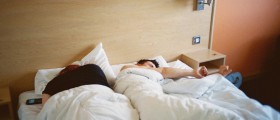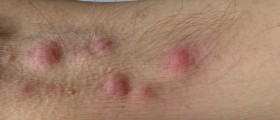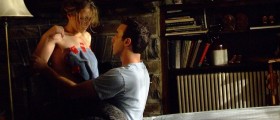Premature ejaculation is considered the most common sexual problem for men younger than 40 years. Requirements for the length of sexual intercourse vary from individual, so the term premature ejaculation is very controversial.
For example, a man can ejaculate after 8 minutes of sexual intercourse. If a woman needs only 5 minutes for orgasm, both partners will be satisfied and it is not considered as premature ejaculation. However, if he delays ejaculation for 20 minutes, and for a woman's orgasm is necessary 35 minutes, the woman will consider this as premature ejaculation. Given that many women aren’t able to experience orgasm, it is necessary to check whether the woman has a problem with delaying orgasm.
Therefore, in the treatment of premature ejaculation it is necessary to start with the sexual histories of both partners. In any case, if sexual intercourse takes a few minutes before ejaculating and if this situation repeats in more than 50% of sexual attempts, there is a problem with premature ejaculation.

Premature Ejaculation Causes and Treatment
It isn’t yet established what specifically causes premature ejaculation, although most attention is paid to psychological factors. Premature ejaculation may be primary - which appears at the beginning of sexual maturity, and secondary - that is, for unknown reasons, occurs later in life.
- Although PE was reported in the medical literature years back in 1887, its first acceptable clinical definition was proposed in 1970 by Masters and Johnson as “the inability of a man to delay ejaculation long enough for his partner to reach orgasm on 50% of intercourse attempts”.
- Primary PE can be triggered by psychological impulses like conditioning, upbringing, or traumatic sexual experience. Secondary PE can be triggered by diabetes, hypertension, hyperthyroidism, alcoholism, or use of recreational drugs. Psychological issues like depression, stress, or anxiety about sexual performance can also trigger PE. In addition, hyperthyroidism is associated with PE and treating the same results in improvement of PE. PE is common in patients with substance abuse. Besides, lack of sleep can lead to low serotonin, also resulting in PE.
- PE can be classified into four major types: (1) Primary/life-long PE; (2) secondary/acquired PE; (3) natural variable PE; and (4) subjective PE/premature-like ejaculatory dysfunction. A primary PE is a form of PE which begins when a male becomes sexually active, while a secondary PE begins later in sexual life.
- Psychotherapy and various behavioral therapies are used in the treatment of PE. Psychological therapy requires strong compliance from the partner and is time-consuming, expensive, and less effective than pharmacotherapy and its efficiency decreases with time. However, it is the first-line therapy in patient with subjective PE or PE with underlying psychological problem. Psychotherapy is also effective in managing the psychological distress associated with sexual dysfunction. Psychosexual counseling is important to address psychological distress due to PE. Methods like meditation/relaxation, hypnotherapy and neuro-biofeedback help improve ejaculatory control. Various behavioral therapies are also useful in patients with PE which includes masturbation before coitus (precoital masturbation) “stop-start” and “squeeze” techniques, use of multiple condoms, and pelvic floor exercise.
- Topical anesthetic cream containing lidocaine and pilocarpine applied to penis about 20 min before sexual intercourse increases IELT from 1.49 to 8.45 min.
- Tramadol is commonly used as an analgesic. It acts as a ?-opioid agonist and an inhibitor of reuptake of 5 hydroxytryptamine (5 HT) and nor-adrenaline (NA).
- The relapse rate is high and ranges from 20 to 50%. In patients with lifelong PE, IELT will return to pretreatment level within one-three weeks after stopping the medications, whereas in patients with acquired PE, treatment of precipitating factors like ED, sexual performance anxiety will result in sustained improvement in IELT even after stopping medicines like SSRIs.
Treatment of premature ejaculation involves the exclusion of all other serious health problems so that premature ejaculation is considered the only problem that should be treated. There are several ways of overcoming this problem:
1. He should be released of the pressureIf premature ejaculation occurs shortly after the attempted sexual intercourse, the couple shouldn’t continue to try sex until premature ejaculation is treated. In the meantime, he can satisfy a woman orally or by manual stimulation. If ejaculation occurs before the sex attempt, even during foreplay, it indicates the seriousness of the problem. Then, this disorder should be treated by specific psychotherapy.
2. Couples can jointly apply certain techniques of sexual therapy such as the stop-start or squeeze-pause method.Woman stops sexual stimulation when she feels he is close to ejaculating. Then she compresses the penis just below the glans. When an urgent need for ejaculation passes, stimulation can continue. If such a process is repeated 10 or more times men will gradually extend ejaculation time.
After that, women and men can sit opposite one another, legs crossed. Woman's legs are over men’s. Then a woman can stimulate the penis rubbing it off her vulval area. When she feels that the man’s excitement increases, she should stop the friction and squeeze the penis until the excitement has passed.
This technique has shown effectiveness in a large number of couples. Considering that this technique extends foreplay, it can shorten the time of experiencing orgasm in women.
3. Application of desensitizing and anesthetic cream on the penisSS-cream in the Far East is proven very effective in reducing sexual irritability and postponing ejaculation. Although this cream is made mostly from plant compounds, it hasn’t been approved by the FDA, so the American area mainly uses lidocaine which has a similar effect.
4. Masturbation 1-2 hours before anticipated sexual intercourseThis is recommended for young men that can achieve new erection soon after premature ejaculation. It is noted that the second time, men have better control over ejaculation.
5. Use of antidepressantsSince delayed sexual climax occurs as a side effect of antidepressants (drugs from the selective serotonin reuptake inhibitors (SSRIs) class, some tricyclic antidepressants), this side effect can be very effective in treating premature ejaculation.










_f_280x120.jpg)






Your thoughts on this
Loading...